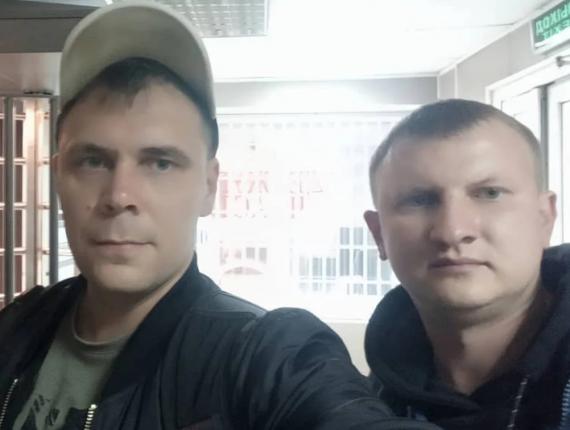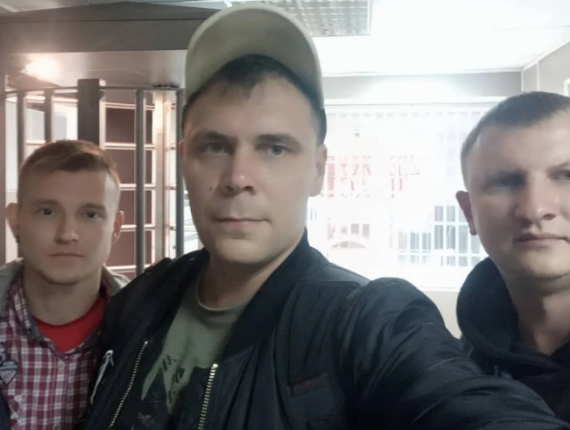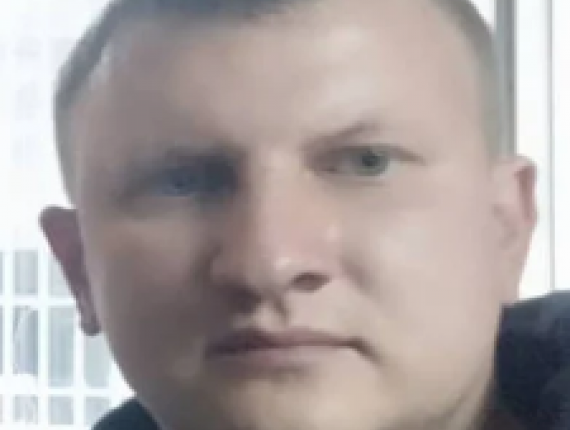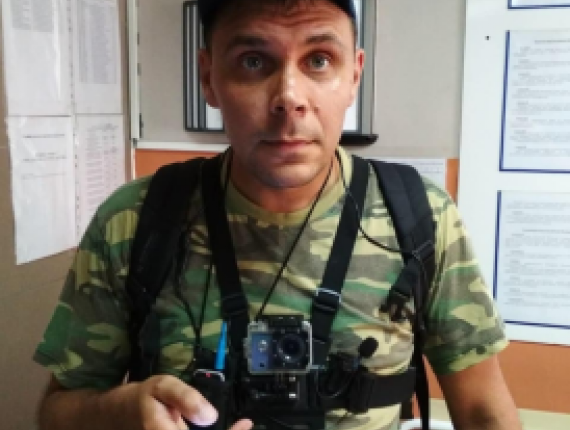Kemerovo bloggers and activists Maksim Lavrentiev and Sergei Kamensky are political prisoners
We believe the activists are being prosecuted for their strong criticism of the authorities
Memorial Human Rights Centre, in accordance with international criteria, considers Kemerovo bloggers and activists Maksim Lavrentiev and Sergei Kamensky political prisoners. We believe they have been deprived of liberty for political reasons in connection with their non-violent exercise of the rights to freedom of expression and dissemination of information. We believe they are being prosecuted for criticising the authorities and that the pre-trial restrictions imposed on them - detention in a remand centre and house arrest - are clearly disproportionate to the public danger of the acts imputed to them.
We demand that Lavrentiev and Kamensky be released immediately, that the charges against them under Article 282 of the Russian Criminal Code be dropped and that other charges against them be reclassified as less serious. We believe these charges must be impartially and scrupulously investigated and reviewed by a court.
Anatoly Sadovin, an associate of Lavrentiev and Kamensky, is also accused under one of the charges. He is currently at large. Memorial also considers the prosecution of Sadovin unlawful and politically motivated.
- What are the charges against Lavrentiev and Kamensky?
Kemerovo bloggers Maksim Lavrentiev and Sergei Kamensky are known in Kuzbass as the founders and activists of the movement, ‘Don't Be Inert.’ As part of the activities of this movement, the activists exposed violations of the law and fought against abuses by the authorities and corruption.
The reason for their criminal prosecution was a series of conflicts with law enforcement officials.
In April 2020 the activists actively combated illegal parking in the city. On one occasion, they had a conflict with a retired Interior Ministry officer who had parked his car illegally. The activists called the police, but, apparently, were attacked by the car owner and his girlfriend. During the conflict, the bloggers sprayed pepper spray. Subsequently, a criminal case was initiated against them for the offence of ‘hooliganism by prior collusion’ (Article 213, Part 2, of the Russian Criminal Code).
On 5 June 2020 the activists made a film about illegal parking outside the headquarters of the Kemerovo FSB. In the course of filming they approached one of the parked cars and demanded that the driver re-park. The car drove away, but an unknown man in civilian clothes, who came out of the FSB building, attacked Kamensky and snatched the camera from his hands. Lavrentiev chased him and sprayed pepper gas in his wake. The unknown man, dressed in civilian clothes, turned out to be an FSB officer and a criminal case was opened against the activists for the ‘use of violence dangerous to life and health against a public official’ (Article 318, Part 2, of the Russian Criminal Code).
On 26 June 2020 riot police stormed Lavrentiev's apartment and detained the bloggers.
Subsequently, Lavrentiev and Kamensky were remanded in custody. The investigation of their case was made the responsibility of the Investigative Committee’s ‘department for especially important cases.’ 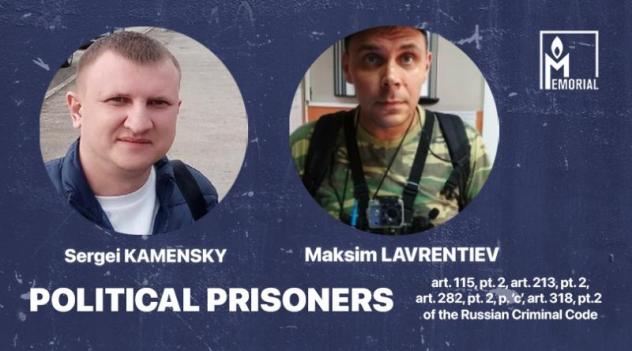
While already on remand, in February 2021 the bloggers learned that a third criminal case had been opened against them on account of their publications for 'incitement of hatred or enmity against law enforcement officials' (Article 282, Part 2, Point C, of the Russian Criminal Code).
Both Lavrentiev and Kamensky have been deprived of liberty for over 18 months (Lavrentiev remains in pre-trial detention while Kamensky was placed under house arrest in November 2020).
In October 2021 their trial began at Kemerovo’s Central district court.
- Why do we consider Lavrentiev and Kamensky political prisoners?
We have studied the case files of Lavrentiev and Kamensky carefully. We consider that the key charge, exposing the real meaning of their criminal prosecution, is that of ‘incitement of hatred or enmity against law enforcement officials’ (Article 282, Part 2, Point C, of the Russian Criminal Code).
Following the partial decriminalization of Article 282 of the Russian Criminal Code, its second part, i. e. commission of a crime by an organized group, does not require prior prosecution for an administrative offence under the Code of Administrative Offences of the Russian Federation, but provides for immediate criminal liability.
In this case, the ‘group’ has been identified as the ‘Don't Be Inert’ community, which was originally created to fight abuses by the authorities as well as the illegal actions of drivers and traders. In other words, the goal of the activists was to uphold the law where it had been violated.
The investigative authorities, in fact, substitute their own interpretations for the law and deliberately distort the intentions of the accused.
As for ‘inciting hatred or enmity,’ the activists were accused of using such words as ‘screws, spongers, cops, prison officer blockheads, mayhem, lawlessness, impunity, judicial cronies.’
It is clear the activists did not call for genocide, discrimination or violence against law enforcement officers, but only criticized their activities in connection with specific violations of the law.
Furthermore, we believe that public officials are not an ‘especially vulnerable social group’ that deserves to be protected from public criticism under Article 282 of the Russian Criminal Code.
In this light, the charges of violence (Article 318, Part 2, of the Russian Criminal Code) and hooliganism (Article 213, Part 2) appear to be merely grounds for immediately putting an end to the bloggers' activities, placing them in custody and conducting searches for additional information.
We believe there are indications that the charges with regard to using violence (Article 318, Part 2, of the Russian Criminal Code) and hooliganism (Article 213, Part 2) have been brought on the basis of falsifications and the charges themselves, in our view, have been intentionally laid in relation to articles of the Russian Criminal Code that carry more serious punishments.
A video recording of the incident with the car owner in April 2020 does not give a complete picture of what happened. However, we have reason to believe that the investigation of the case was biased and the classification of the actions of Lavrentiev and Kamensky as criminal offences is completely unfounded. In particular, the forensic medical examination retroactively changed the assessment of the harm caused to the victim's health. Furthermore, the assertion that the activists ‘entered into criminal collusion in advance’ to fire pepper spray in the direction of the car owner who attacked them seems absurd.
The charges in the second case have even more obvious contradictions and violations. It is clear the bloggers could not have known that the victim was an FSB officer and the video footage, which fully captures the incident, shows that the man in civilian clothes seen running away could not have suffered the injuries attributed to him.
This gives us reason to believe the investigators have not been able to prove the activists' use of force was unreasonable and therefore we cannot consider that these charges exclude the possibility of recognizing Lavrentiev and Kamensky as political prisoners.
More information about this case and the position of Memorial Human Rights Centre is available on our website.
Recognition of an individual as a political prisoner or as a victim of a politically motivated prosecution does not imply Memorial Human Rights Centre agrees with, or approves of, their views, statements, or actions.
- How to help
You can support all political prisoners by donating to the Fund to Support Political Prisoners of the Union of Solidarity with Political Prisoners via PayPal, using the e-wallet at helppoliticalprisoners@gmail.com.


